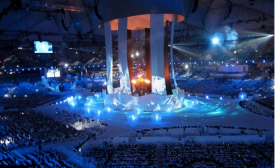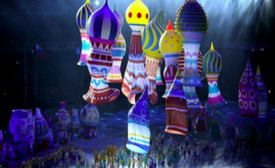olympics
While mega-events can involve colossal facilities of little use post-event, they can also provide reputational benefits and be seen as an investment in a nation's brand.
This week, a thousand homeless families in São Paulo reportedly moved into a site just two miles from the opening venue of the World Cup. They were bussed to the site by the Landless Workers' Movement, which says the occupation aims to highlight the failure of government promises to improve social housing.

ADLER, Russia — The Sochi 2014 Winter Games drew Sunday night to a close, an Olympics intent on projecting the image of a strong and confident new Russia across this vast country and to the world beyond, with a mighty Russian team awakening the echoes of the mighty Soviet sport system to prideful spectator cheers of “Ro-ssi-ya! Ro-ssi-ya!”
Albeit, over 17 days, to the beat of “Get Lucky” by a Russian police choir. And cheerful volunteers yelling, “Good morning!” while dancing to the Black Eyed Peas.

China, the United Arab Emirates, Indonesia, and Russia are now known globally for their economic strength. But what about their cultures?
For a city, there’s nothing quite like the glory of winning an Olympic bid. The highly competitive process starts nine years before the games and involves untold amounts of campaigning and planning. Once selected, fortunate cities have seven years to prepare, updating their infrastructure and building new, impressive facilities. If they pull it off, they get two weeks to show it all off to the entire world.
This video features members of the U.S. Olympic Team and the U.S. Paralympic Team competing in the 2014 Sochi Olympics. The video’s theme, "We are all Athletes," emphasizes that although the lives of Olympic and Paralympic athletes may differ in some ways, they are all dreamers, competitors, champions, and teammates.
"How is it possible that an area of about 400,000 people can be responsible for eight out of nine gold medals?" said Stig Arve Sæther, a researcher at the Norwegian University of Science and Technology (NTNU).
"How is it possible that an area of about 400,000 people can be responsible for eight out of nine gold medals?" said Stig Arve Sæther, a researcher at the Norwegian University of Science and Technology (NTNU).







